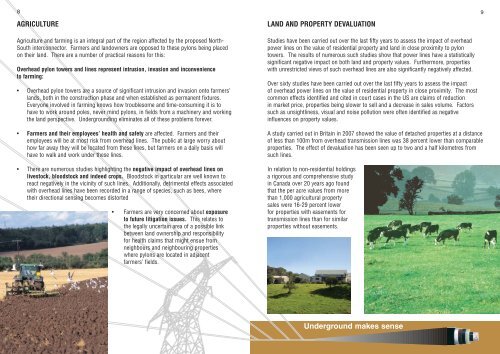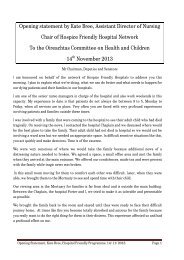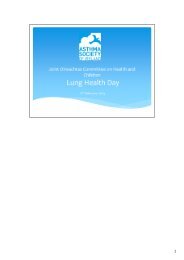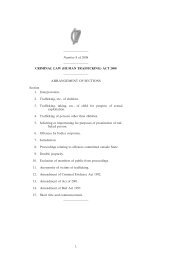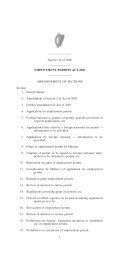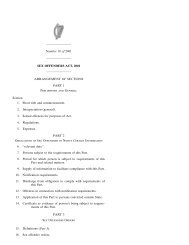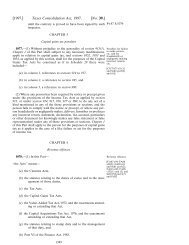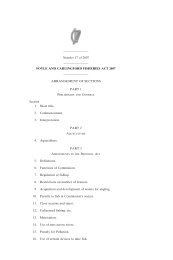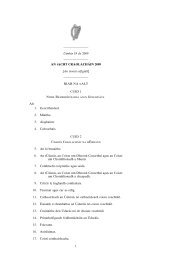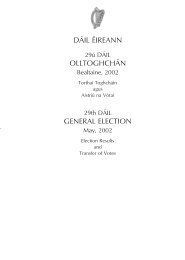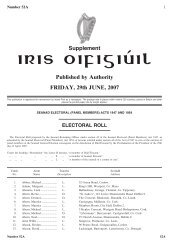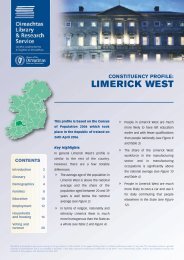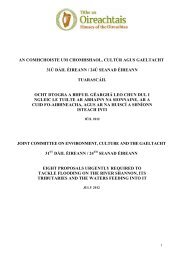north east pylon pressure
north east pylon pressure
north east pylon pressure
You also want an ePaper? Increase the reach of your titles
YUMPU automatically turns print PDFs into web optimized ePapers that Google loves.
8<br />
AGRICULTURE<br />
Agriculture and farming is an integral part of the region affected by the proposed North-<br />
South interconnector. Farmers and landowners are opposed to these <strong>pylon</strong>s being placed<br />
on their land. There are a number of practical reasons for this:<br />
Overhead <strong>pylon</strong> towers and lines represent intrusion, invasion and inconvenience<br />
to farming:<br />
• Overhead <strong>pylon</strong> towers are a source of significant intrusion and invasion onto farmers’<br />
lands, both in the construction phase and when established as permanent fixtures.<br />
Everyone involved in farming knows how troublesome and time-consuming it is to<br />
have to work around poles, never mind <strong>pylon</strong>s, in fields from a machinery and working<br />
the land perspective. Undergrounding eliminates all of these problems forever.<br />
• Farmers and their employees’ health and safety are affected. Farmers and their<br />
employees will be at most risk from overhead lines. The public at large worry about<br />
how far away they will be located from these lines, but farmers on a daily basis will<br />
have to walk and work under these lines.<br />
• There are numerous studies highlighting the negative impact of overhead lines on<br />
livestock, bloodstock and indeed crops. Bloodstock in particular are well known to<br />
react negatively in the vicinity of such lines. Additionally, detrimental effects associated<br />
with overhead lines have been recorded in a range of species, such as bees, where<br />
their directional sensing becomes distorted<br />
• Farmers are very concerned about exposure<br />
to future litigation issues. This relates to<br />
the legally uncertain area of a possible link<br />
between land ownership and responsibility<br />
for health claims that might ensue from<br />
neighbours and neighbouring properties<br />
where <strong>pylon</strong>s are located in adjacent<br />
farmers’ fields.<br />
LAND AND PROPERTY DEVALUATION<br />
Studies have been carried out over the last fifty years to assess the impact of overhead<br />
power lines on the value of residential property and land in close proximity to <strong>pylon</strong><br />
towers. The results of numerous such studies show that power lines have a statistically<br />
significant negative impact on both land and property values. Furthermore, properties<br />
with unrestricted views of such overhead lines are also significantly negatively affected.<br />
Over sixty studies have been carried out over the last fifty years to assess the impact<br />
of overhead power lines on the value of residential property in close proximity. The most<br />
common effects identified and cited in court cases in the US are claims of reduction<br />
in market price, properties being slower to sell and a decrease in sales volume. Factors<br />
such as unsightliness, visual and noise pollution were often identified as negative<br />
influences on property values.<br />
A study carried out in Britain in 2007 showed the value of detached properties at a distance<br />
of less than 100m from overhead transmission lines was 38 percent lower than comparable<br />
properties. The effect of devaluation has been seen up to two and a half kilometres from<br />
such lines.<br />
In relation to non-residential holdings<br />
a rigorous and comprehensive study<br />
in Canada over 20 years ago found<br />
that the per acre values from more<br />
than 1,000 agricultural property<br />
sales were 16-29 percent lower<br />
for properties with easements for<br />
transmission lines than for similar<br />
properties without easements.<br />
Underground makes sense<br />
9


